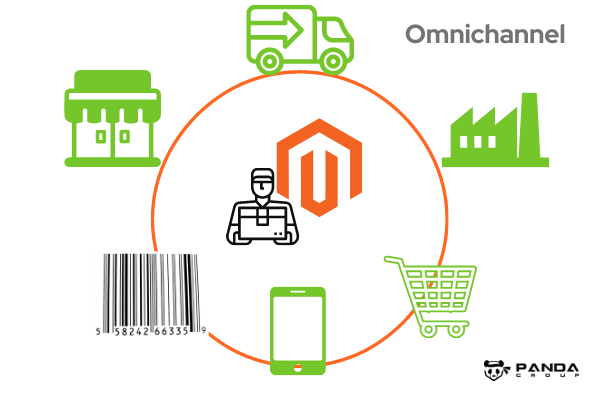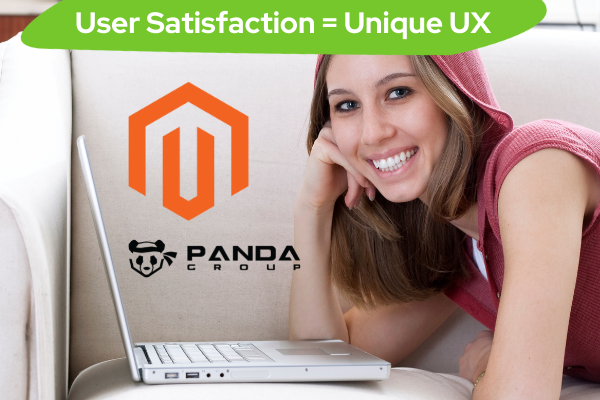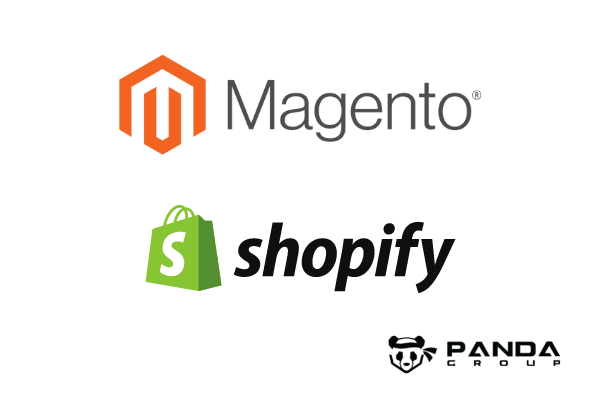Magento is one of the most popular eCommerce platforms worldwide. It’s used by millions of businesses, from small start-ups to the world’s largest corporations. But what are the pros and cons of using the Magento eCommerce platform? And how will Magento’s open-source situation change in 2022?
In this article, we’ll look at the history of Magento since 2007 and compare it to Adobe Commerce and other open-source and Saas solutions.
We’ll also explore how Magento can be used for both B2B and B2C businesses, and discuss omnichannel retailing. Finally, we’ll give our opinion on whether Magento is the best eCommerce platform available.
Magento OS and Adobe story
Magento was originally released as an open-source platform in 2007 and quickly gained popularity among e-commerce businesses. For all these years it has remained a robust, versatile, and highly scalable platform for all sizes of e-commerce businesses.
Adobe acquires Magento in 2018
But in 2018, Adobe announced the acquisition of Magento. This fact sparked a lot of debate among the Magento community. Some people were happy about the move, believing that Adobe’s resources and support would help take Magento to new heights. Others were worried about what this meant for the future of Magento OS.
However, Adobe has been very supportive of the open-source community and continues to develop and improve the platform. In fact, many believe that Adobe has actually contributed a lot to Magento’s development.
Adobe support for Magento OS
Others claim that Adobe could be more cooperative with the Community. But at the end of the day, Adobe is a commercial company and its priority is to make money. So it’s only natural that they would want to control Magento more tightly.
It appeared that Adobe continued to support the Magento eCommerce platform source by releasing new versions and providing bug fixes and security patches. However, there were some concerns about how much Adobe would invest in Magento OS development.
It is interesting fact that Adobe decided to support Magento Open Source after the platform has been split from Adobe Commerce. What does this say about the viability of Magento in the long term?
Adobe’s decision to support both versions of Magento suggests that it sees a lot of potential for growth in the open-source space and believes that Magento will continue to be a major player in the eCommerce market for years to come.
What is the difference between Magento open-source and Adobe Commerce?
Adobe is shifting with its products toward SaaS solutions. They naturally build an ecosystem for users by delivering features and combining them according to the user’s needs. Adobe Commerce is still based on the Magento code and engine, but no longer has an open-source structure.
The budget required for Adobe Commerce is much higher than this necessary for Magento Open Source. And the work of Magento developers is still the precious source of innovation in the e-commerce market. Adobe and Magento developers are being combined in the mutual interest of improving their products. So far, they are under pressure from the strong e-commerce providers’ competition.
Magento OS vs Adobe Commerce
So far both sides cooperate for product improvement through Magento Open Source remains a free platform with accessible and flexible code enabling smart developers to create a unique, tailored made e-commerce with all the high-level features and great scalability.
Magento OS is in fact a cheaper version of Adobe Commerce, so maybe both models may differentiate enough and share the market by delivering an open-source with customizable edge and more complex platform with standard solutions for the big players.
Magento and Adobe Commerce which one to chose?
So which platform is better for your business – Magento OS or Adobe Commerce?

Well, it really depends on your needs, preferences and budget. Magento Open Source is a great platform for businesses that want to keep their costs down, while Adobe Commerce is better suited for businesses with larger budgets. Both platforms have their advantages and disadvantages, so it’s important to do your research before making a decision.
Magento OS perspectives in 2022
At Panda Group Magento Agency, we focus on developing a customized Magento platform dedicated to each online store individually. Starting with Magento out of the box, we customize Magento for online retailers’ needs.
After all these years we work with Magento, we conclude it is still a robust and comprehensive platform with endless possibilities that we can offer to our clients and partners.
Magento customization is only possible with the open-source community version. Thanks to custom modules, customized templates, native multi-store setup, we can achieve a really good eCommerce platform appreciated by thousands of Magento users worldwide.
Magento Community initiative
Adobe’s technical support and Magento OS initiative from the Magento large community appearing in 2021 shows that the innovation will still take place in the comming future. And the global platform Magento’s strength will persuade eCommerce entrepreneurs to invest in Magento eCommerce solutions.
We write more about the Magento OS future perspectives in the following article
⇨ 2021/22 trends and future perspectives for Magento e-commerce platform
After all these years, Magento’s mature status is appreciated and its future perspectives are proven each year by Adobe and Magento Community.
Magento pros as an eCommerce solution
In the eCommerce market, Magento is a well-known platform with many advantages. It is considered robust and comprehensive with endless possibilities. It allows the development of tailored-made eCommerce solutions for businesses of all sizes. It has a global scale and reaches as well as continuous innovation and development.
- Flexibility
- Scalability
- Customization
- Innovation
- Technical advancement
- Global scale
Magento eCommerce platform flexibility for now and the future
One of the main advantages of Magento is its flexibility. It can be adapted to meet the specific needs and requirements of businesses of all sizes, from small businesses to large corporations. The platform is also easily adaptable in all technical environments.
Open Source structure allows aligning with all challenges existing nowadays as well as those appearing in the future which is a significant edge in the very competitive e-commerce environment.
With Magento, all your business needs are possible to meet no matter what the future brings. There are no technological limitations.
Magento and microservices architecture
Magento is a monolith eCommerce platform with a great potential for developing microservices that take over certain functionalities. The Magento eCommerce platform is comprehensive out of the box and flexible at the same time to easily incorporate the external system components and work seamlessly with them..
The Magento open-source background is extensible to incorporate all technology stacks to satisfy the ever-growing needs of digital commerce.
One platform for different business models B2B and B2C
Magento is a platform that can be used by businesses of all sizes and types. It is perfect for both BtoB and BtoC businesses, as it provides the flexibility and scalability they need to succeed.
Additionally, Magento offers a wide range of features that are perfect for eCommerce businesses, no matter which model you chose.
As one of the most mature eCommerce platforms, it gives endless possibilities for building offerings, from highly customizable products to rental and subscriptions models.
The successful story of implementing a variety of offer models at one of our clients’ Magento store, which is tink.de – a marketplace for IoT products, is described in the case study on Rental Subscription model for SMART home products
Magento 2 PWA
Progressive Web Application PWA technology allows online shopping from mobile devices with a mobile app experience. What’s more, there is no need to separate the mobile app from the website, they are managed from one place and work on customers’ devices even with internet interruption while being temporarily offline.
If you need more information about Magento PWA Development feel free to ask or visit our service page.
Magento scalability
Such a comprehensive e-commerce platform is a great option to start up with, grow together while developing additional features need on the daily basis and scale up when conquering new markets. Magento can easily be the only platform for a lifespan from a start-up to a large global company.
One platform for all your e-commerce
It seems that the Magento e-commerce platform is going to be a great option for different stages of store life. Especially when no further versions of Magento are predicted, so migrating from Magento 2.4 to higher versions won’t be necessary. In 2022, Magento will focus on features improvement and security patches.
Magento Amazon integration
As it was mentioned before, the open-source architecture allows you to combine with all existing systems which are crucial in the market with diverse players and services you can easily add to your Magento site.
Magento online stores integrate with global marketplaces such as Amazon and eBay, so you can reach new markets and enlarge them exponentially, increasing your sales.

We explain how to integrate Magento with Amazon in another blog article Amazone Marketplace integration with Magento
Magento 2 – a highly customized e-commerce platform
Magento is an extremely flexible platform that can be adapted to the needs of any business. It offers a wide range of features and functions that perfectly match their individual business goals.
Magento extensions variety
Another great thing about Magento is the huge number of extensions that are available. This allows businesses to add additional features and functionality to their store without having to write code themselves.
There is a huge variety of extensions to choose from, so you’re sure to find one that meets your specific needs. You can choose from the vast offer of the Magento Marketplace. If you have any problems or questions about which extension to chose to best fit your expectations, feel free to ask our Expert.
Omnichannel experience with Magento
The omnichannel experience is one of the main advantages that Magento has over other eCommerce platforms. With Magento, you have complete control over the shopping experience, no matter where they are or what device they’re using.
You can create a truly unified shopping experience across all channels and provide a consistent customer experience no matter how they choose to shop with you. Magento also supports multiple sales channels, so you can sell your products through any combination of online and offline channels.
Omnichannel e-commerce expectations
Connecting your Magento online store to point of sale (POS) or warehouses and sharing necessary real-time data to support merchants is not a problem. Clients expect to be able to buy everything through any channel, including brick-and-mortar shops as well mobile devices.
More about the omnichannel approach please read on:
Why Magento is the best platform for the Omnichannel eCommerce
And here you have some examples of successful implementations of omnichannel features
Magento multistore implementation

Magento User Experience (UX)
The e-commerce industry has become very competitive. The market is full of small and big players competing for the clients’ attention and involvement leading to purchase. Not without significance is the fact that today’s customers are increasingly demanding. Their expectations are growing, and when they do not get what they want you may easily lose them in favour of your competition.

User experience as your competitive edge
How to stand out from so many other websites? What are the options? One is certainly a unique user experience on your web page.
Magento being an open-source platform offers great flexibility in this area. You can create custom designs, layouts and clients’ journeys that will be unique to your store. This will help you stand out from the competitors and provide a better experience for your customers.
Why user experience is important?
We cannot stress enough how important it is to have a great user experience on your website. This is one of the key factors that will help you to stand out from the crowd and:
- convert users into clients,
- boost purchase amount,
- have higher customers involvement,
- increase clients’ loyalty.
So if you’re looking for a platform that will provide you with a customised user experience, Magento is definitely the best option available.
A deeper look at how to check the user satisfaction on your site and how to design and implement a great user experience we present in the following article User Experience design for Magento e-commerce platform
Magento OS and Adobe Innovation
Magento Open Source profit now and will get an advantage in the future of two backgrounds:
- Magento innovation approach
- Adobe technical support
Magento OS Community
Magento is not only a product but also a platform, and the Community cooperates to make it better, they have a fresh new perspective and apply cutting edge technology.
Magento OS developers cooperate to improve the platform and they present an innovative approach based on the experience from the market. One of the recent examples is a Hyvä Themes successful introduction.
Hyvä Themes for Magento frontend
Hyvä Themes offers a new way to build out storefronts for Magento 2, with an emphasis on speed and usability. You can get your site up in a short time perspective without having any worries about browser compatibility or performance issues thanks to their alternative solution that doesn’t put you into JavaScript-only territory!
At Panda Group we use this newest technology to lower resource requirements and increase Magento performance. The main advantages here are lightweight because of less code quantity and compliance with Google Core Web Vitals a new mark up for websites deciding about their search ranking SERP.
We realise how important it is for an e-commerce store to optimize for the search engine (SEO) to attract traffic to the website. Hyvä Themes complement Magento’s strong SEO management capabilities.

More information about Hyvä Themes for Magento OS please find in the following blog article Hyvä Themes – a new Magento e-commerce frontend software.
Adobe support technical advancement
Adobe company is a reliable partner that Magento Open Source Community can rely on for the future. They have a wealth of experience and technical support to offer, and they bring their own innovations to the platform.
Adobe has been involved with Magento since its early days, helping it grow into the successful eCommerce platform it is today.
Adobe page builder for Magento Open Source
Last year Adobe page builder was released for the Magento eCommerce platform enabling content management with no coding and simple page composing with drag and drop functions.
The modular structure allows creating product and landing pages with no developing skills.
This type of tool is highly appreciated by e-commerce merchants as it gives them the ability to create and publish an offer no digital in no time.
More useful information about this tool please find in the Magento User Guide.
Adobe Sensei
Imagine a world where you can have intelligent personal assistants that give advice on what to do next and make your life easier. Adobe Sensei is the technology behind these artificial intelligence functions for businesses that want to increase workflow efficiency and help customers get more out of every interaction by offering personalized services tailored just right for them!
Artificial Intelligence (AI) for Magento e-commerce platform
Magento has made a name for itself in the e-commerce industry by offering an array of artificial intelligence features. From product suggestions during web searches to customer service automation tools – they have it all!
With the Magento eCommerce platform, you will certainly be up to date with the most advanced technology of machine learning and artificial intelligence application for better e-Commerce management and your website user experience.
One of the basic AI usages for an e-commerce platform is elastic search. This technology makes your products appear to be created specifically for specific users. It suggests synonymous and combined history with cross-selling products.
Elastic search boost conversion rates and provides friendly recommendations that are tailored to customers’ needs based on their preferences and search history!
We implemented AI-based elastic search technology in one of our online stores using Algolia search API.
Global e-commerce platforms
Another major advantage of Magento is its global scale and reach. It has a large community of users and developers and is used by businesses all over the world.
This makes it an ideal platform for businesses that want to expand their operations into new markets or regions. Magento’s global scale also ensures that businesses have access to the latest features and innovations as they are released.
The marketplace is forcing innovation all over the globe, and Magento specialists are present everywhere to create appropriate solutions. Many of these are discussed at Magento Meetings all over the World.
World Magento Meetups
Magento Meetups taking place in 30 countries worldwide are the place to exchange knowledge and discuss innovations and directions. It’s a great place for you if you want to get more knowledge about Magento, make relations with Experts or become a member of the community.
Here you can find a report from Meet Magento PL and Meet Magento UK describing the main topics we were interested in.
Magento vs other e-commerce platforms
When it comes to comparing Magento with other e-commerce platforms, it’s important to look at the different features that each platform offers. But first, we need to distinguish between open-source platforms and SaaS (Software as a Service) platforms.
Magento vs other open-source platforms
The most popular open-source e-commerce platform is WooCommerce, a WordPress plugin. As a CMS plugin, it is dedicated to small businesses of all kinds and is not recommended for e-commerce sites. It is not as scalable, robust or feature-rich as Magento.
WooCommerce advantages
You may consider WooCommerce when your business model is not focused on e-commerce or you plan to sell products or services on a limited scale. The products are not complex and configurable, you don’t expect too much automation, and you do not plan to sell in multiple markets.

WooCommerce development is much cheaper than Magento, but also its possibilities are limited.
We’ve compared Magento with WooCommerce in detail on our Blog – Magento 2 vs WordPress plugin – WooCommerce
Magento vs other SaaS platforms
Comparatively, SaaS is a hosted platform and more expensive than WooCommerce and Magento. It’s suitable for businesses that want to set up an online store quickly and easily without having to worry about the technical details and has no problem with a lack of influence on the store structure.
When comparing Magento with other SaaS e-commerce platforms, it is important to consider that Magento is an open-source platform while the others are proprietary software, which influences in negative manner flexibility and customization.
Magento advantages over SaaS platforms
This gives Magento a number of advantages, including:
- freedom from vendor lock-in: Magento is not controlled by a single vendor, so you are free to switch providers if you are unhappy with the service or features offered;
- greater flexibility and customization: as an open-source platform, Magento offers more flexibility and customization than proprietary software;
- access to the code source: using Magento you have access to the source code, which allows for further customization and extension;
- community support: Magento has a large and active community of users and developers who offer support and assistance.
Magento independence and power
Compared to SaaS products, Magento is a fully customizable and flexible solution that gives managers total freedom in store development.
With Magento, you will develop a tailor-made eCommerce site according to your business needs which will differentiate your website from the others and empower them in the market competition.
Software as a service (SaaS) convenience
SaaS platforms are based on ready and the box product which will never belong to you. As long as you use the software as a service, you may use their technical and customer support and features available for all other users.
SaaS platforms take all the technical, performance and security issues off your mind. They definitely give you a standardized product similar to others used in the market.
With a web page similar to the other websites it’s difficult to differentiate, build a unique user experience, and gain a performance competitive edge.

Here you can find Magento’s comparison to the Shopify SaaS platform.
Magento vs competition conclusion
To compare Magento to the competition it is an obvious, comprehensive platform that offers a wide range of features while some other platforms are more limited in their scope.
This can make Magento a better option for businesses that want more control over their online presence and want to be able to customize their website according to their specific needs.
Magento Cons
Magento as a complex eCommerce platform has also some cons and inconveniences, especially in the short term. Shortly speaking its high quality has its cost.
Long implementation time
Developing a tailored made platform usually take weeks or even months, while most SaaS platforms can be implemented in a matter of days.
This means consuming a lot of resources like time and development costs. But you receive in exchange a solid fundament for your e-commerce business for years. It will be easier to adjust the Magento platform to your future needs.
High maintenance
Running a Magento store requires regular updates and maintenance, which can be time-consuming and costly. While most SaaS platforms offer automatic updates and maintenance, this is not always the case with Magento.
To optimize maintenance, you should cooperate with a skilful and smart Magento Development Agency specialized in e-commerce. Check their portfolio carefully and be sure to communicate all your needs openly.
Here are 5 questions to ask when choosing the right Magento Agency.
Technical knowledge required
Magento is not as user-friendly as some of the other eCommerce platforms available, so it requires a higher level of technical knowledge to be able to use it effectively. This can make it difficult for businesses without in-house IT expertise to set up and run their store.
Cost optimization
Furthermore, Magento is one of the most expensive eCommerce platforms available. High costs are the main disadvantages of Magento however they are justified by the high quality of service.
From our practice, it shows that incorrect usage can lead to high costs. If not implemented or used correctly, Magento can be expensive. This is because it requires customization and development, which can be costly if not done properly. In addition, you need to consider the cost of hosting and maintaining a Magento store.
We have experience in Magento cost optimization, so if you want, we can check what can be done for your individual situation.
Clutch ranking for Magento Development
Above, we mentioned a few issues explaining why it is crucial to choose the right Magento Development Agency. The one which will not only develop in the short perspective but also think about future needs when your store will be scaling up.
Thinking, planning and developing for the long-distance perspective requires a businesslike approach and an extraordinary relation and trust between partners.
Building long term relations is one of the factors determining a solid basis for your e-commerce success. You can check who you start cooperation with and decide if you may rely on them evaluating, for example, a Clutch account consisting of reviews verified in real life and not depending on algorithms.

We encourage you to check Panda’s Group Clutch history and our reviews. How to become a trustworthy Magento partner is described in our blog article Best Magento Development Agencies in Poland – Panda Group at the Clutch ranking
If you have any additional questions, feel free to ask – Let’s talk!



 (No Ratings Yet)
(No Ratings Yet)